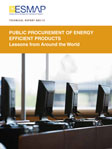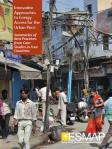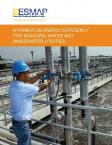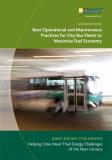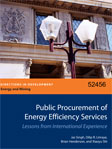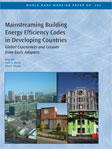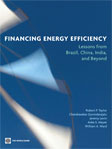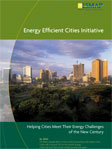Innovative Approaches to Energy Access for the Urban Poor
Rapid urban growth in developing countries has created an unprecedented demand for energy services. Cities face the enormous challenge of improving energy access to urban communities in order to improve education, health and basic socioeconomic conditions. These eight case studies demonstrate innovative, successful approaches to delivery of energy services to the urban and peri-urban poor. The case studies focus on electricity and clean fuels, and are taken from India, Brazil, Colombia and Bangladesh.
Tool for Rapid Assessment of City Energy (TRACE): Helping Cities Use Energy Efficiently
The Tool for Rapid Assessment of City Energy (TRACE) is a decision-support tool designed to help cities quickly identify under-performing sectors, evaluate improvement and cost-saving potential, and prioritize sectors and actions for energy efficiency (EE) intervention. It covers six municipal sectors: passenger transport, municipal buildings, water and waste water, public lighting, solid waste, and power and heat.
A Primer on Energy Efficiency for Municipal Water and Wastewater Utilities
Improving energy efficiency is at the core of measures to reduce operational cost at water and wastewater utilities. Since energy represents the largest controllable operational expenditure of most WWUs, and many EE measures have a payback period of less than five years, investing in efficiency supports quicker and greater expansion of clean water access for the poor by making the system cheaper to operate.
Best Operational and Maintenance Practices for City Bus Fleets to Maximize Fuel Economy
Many cities are dominated by often old and fuel-intensive buses with high operating costs. This guidance note provides detailed and practical recommendations on how city bus operations managers and their technical staff can plan and implement enhancements to their fleets through operational and maintenance practices without significant capital investments.
Public Procurement of Energy Efficiency Services: Lessons from International Experiences
This study looks at a largely untapped energy efficiency market, the public sector. While the efficiency potential in this sector is substantial, the implementation of energy savings programs has been complicated by a number of factors, such as insufficient incentives to lower energy costs, rigid budgeting and procurement procedures, and limited access to financing.
Energy Efficient Cities: Assessment Tools and Benchmarking Practices
Urban areas account for two-thirds of global energy requirements while housing approximately half of the world’s population. With current projections indicating that 70 percent of the world’s population will live in cities by 2050, an increase in urban energy use is inevitable. In the face of this growing energy demand, developing climate-friendly urban energy solutions is imperative.
Mainstreaming Building Energy Efficiency Codes in Developing Countries: Global Experiences and Lessons from Early Adopters
Building energy efficiency codes, which regulate the energy performance of building design and its compliance during construction, are broadly recognized as a necessary government intervention to overcome persistent market barriers to capturing the economic potential of energy efficiency gains in residential, commercial, and public service buildings.
Financing Energy Efficiency: Lessons from Brazil, China, India, and Beyond
Greater energy efficiency is key for shifting country development paths toward lower-carbon economic growth. Especially in developing countries and transition economies, vast potential for energy savings opportunities remain unrealized even though current financial returns are strong. This volume examines the nature of this dilemma and how it may be overcome in practical and operational terms.
Energy Efficient Cities Case Studies Database
EECI's Case Studies Database is home to several dozen urban energy efficiency case studies across all sectors—transport, buildings, lighting, water, solid waste, heating/power—in both developing and developed countries.
ESMAP's Energy Efficient Cities Initiative
Cities are an important engine for economic growth and socioeconomic development. By 2030, almost 5 billion (about 60 percent of the global population) will live in cities, leading to massive requirements for energy to power growth and expand basic infrastructure. Energy efficiency can offer practical solutions to budget-constrained cities to meet their energy needs without sacrificing their development priorities. This is because energy efficient activities are generally cost-effective; that is, higher upfront investment for a more efficient system is offset by lower recurring energy costs. In October 2008, ESMAP launched the five-year Energy Efficient Cities Initiative (EECI) to promote energy-efficient programs and planning among cities in developing countries.
For more information, go to here.
